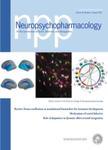版权所有:内蒙古大学图书馆 技术提供:维普资讯• 智图
内蒙古自治区呼和浩特市赛罕区大学西街235号 邮编: 010021

作者机构:Max Planck Inst Human Cognit & Brain Sci Max Planck Fellow Grp Cognit & Affect Control Beh Leipzig Germany Tech Univ Dresden Dept Psychol Dresden Germany Otto Von Guericke Univ Dept Neurol Magdeburg Germany Leibniz Inst Neurobiol Dept Behav Neurol Magdeburg Germany Charite Univ Med Berlin Campus Charite Mitte Dept Psychiat & Psychotherapy Berlin Germany
出 版 物:《NEUROPSYCHOPHARMACOLOGY》 (神经精神药理学)
年 卷 期:2017年第42卷第3期
页 面:628-637页
核心收录:
学科分类:1007[医学-药学(可授医学、理学学位)] 1002[医学-临床医学] 1001[医学-基础医学(可授医学、理学学位)] 10[医学]
基 金:Max Planck Society German Research Foundation [DFG SCHL1969/1-1, DFG SCHL 1969/2-2]
主 题:Computational modeling decision making FLEXIBLE Functional Neuroimaging Behavior Control Error of prediction Binge Eating Disorder
摘 要:Despite its clinical relevance and the recent recognition as a diagnostic category in the DSM-5, binge eating disorder (BED) has rarely been investigated from a cognitive neuroscientific perspective targeting a more precise neurocognitive profiling of the disorder. BED patients suffer from a lack of behavioral control during recurrent binge eating episodes and thus fail to adapt their behavior in the face of negative consequences, eg, high risk for obesity. To examine impairments in flexible reward-based decision-making, we exposed BED patients (n = 22) and matched healthy individuals (n = 22) to a reward-guided decision-making task during functional resonance imaging (fMRI). Performing fMRI analysis informed via computational modeling of choice behavior, we were able to identify specific signatures of altered decision-making in BED. On the behavioral level, we observed impaired behavioral adaptation in BED, which was due to enhanced switching behavior, a putative deficit in striking a balance between exploration and exploitation appropriately. This was accompanied by diminished activation related to exploratory decisions in the anterior insula/ventro-lateral prefrontal cortex. Moreover, although so-called model-free reward prediction errors remained intact, representation of ventro medial prefrontal leaming signatures, incorporating inference on unchosen options, was reduced in BED, which was associated with successful decision-making in the task. On the basis of a computational psychiatry account, the presented findings contribute to defining a neurocognitive phenotype of BED.